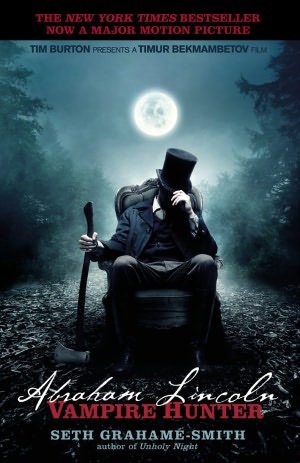WARNING. REVIEW MAY CONTAIN MINOR SPOILERS.
I knew I wanted to see the movie as soon as I layed eyes on the trailer. Well, I ended up missing it in the cine and picking up the book instead. I read a couple of book vs movie reviews, and most seemed to say that the movie was pretty on par with the book, which caused me to become more resolved to finish the book first.
So how did the movie compare to the book? First off, I'd have to disagree with those that claimed it was in line with the book. That's not to say the movie was bad. I certainly liked it well enough (though, like the book, I can't see myself coming back to it). However, like it or not, it had a lot of differences from the novel.
The first thing I noticed was the movie gave Abe a negro friend, who later replaces Lamon as Lincoln's bodyguard. First off, what little I know of Old Abe I have learned that he was not always anti-slavery. With this in mind, he certainly wouldn't have a negro friend as a child and throughout life. Now, I can hear you saying, "But, Nic, this is a work of fiction," and you make an excellent point. However, even in the book, Abe doesn't truly consider the black man equal to the white man. He believes they both have an equal right to life, but he doesn't believe they ought to have the same rights as the white male.
Other things that bothered me involved the vampires. In the book, Abe vows to kill all the vampires in America after his mother is killed. In the movie however, our Abe only cares about putting down the vampire that is guilty of his mother's death. Of course, he still kills plenty of vampires, but only because Henry promises Abe things if he does. Speaking of Henry, remember the time he saves Abe in the book by killing a vampire? Well, there's none of that in the film. Well, Henry still saves Abraham from a vampire, but the movie has it where vampires are unable to kill their own kind. I have to say it's an interesting concept, and with it in play, it brings more logic as to why vampires would recruit humans for vampire slaying. However, I couldn't help thinking, "Why?" Why would vampires be unable to kill their own kind? Humans can kill humans. Animals can kill their own kind. So why can't a vampire kill another vampire? The other major difference between the book vampires and movie vampires is how they are killed. In the book, it is more a matter of training rather than special tools. In the novel, you just need to stop the heart and maybe cut off the head (it was unclear to me if you had to perform the latter or whether it was an either or option) whereas in the movie, you needed silver to slay the vampire. Now, the silver addition made for some nice visual scenes, along with an extra scene that wasn't needed in the book, but I liked the not needing silver for the supernatural. Of course, each to his own. If you like the silver weakness, good for you. Hell, I'm not even against it, but it's nice to see something else for a change.
So besides vampires and giving Abe new friends, what else did the film change? Of course, like any adaptation, there were small changes. The movie completely removes Lamon and Armstrong, keeping only Speed. It also gets rid of Abraham's first love and has Mary Todd be the only woman. Although they are changes, I can easily see why they were done. All of these characters can be removes and yet the story could essentially be the same. Now, the movie did also change Mary Todd's character, making her much stronger than in the book. In the movie, she can be found helping in a Civil War plot while in the book, Mary Todd is, for the most part, complaining or mourning (though with good reason).
The final major difference I noticed between the two mediums is their focus. The book seemed to integrate the vampire hunting into Lincoln's life so we got to see more of Abraham's career life and the general growing up along with the vampire hunting. The movie primarily focused on the vampire hunting and little else. Personally, I felt that the focus on the hunting made it feel more like a story rather than an alteration in history. I also felt that the book Abe seemed more like the real Abraham though more factors than just story went into that (movie Abe was just too damn pretty).
As to which telling I liked more, I did prefer the book to the movie, but that's not to say the film was a complete disaster. It has some great action scenes, and it was visually appealing. I also especially liked the end where we see Henry in modern day times, repeating a line he said to Abe (though it did remind me of Lestat in Interview With a Vampire. "I am going to give you the choice I never had."). I can seen a lot of the nonbook reader enjoying the film. As for those who have read the book, it's more of a toss up. All I can say is watch it and decide for yourself.



